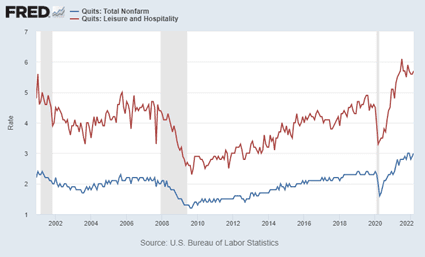By Daria Knupp, Sr. Content Marketing Manager
What is the Great Resignation?
You probably heard about the Great Resignation, the Big Quit, or the Great Reshuffle. But what does it mean?
Here we break it down for you in common language, consider the particular impact on the events and hospitality industries, and share some effective response strategies.
Who’s Leaving and Why?
According to SHRM, a record 47.8 million people voluntarily left the workforce in 2021. What is particularly interesting, however, is that this is only somewhat more than what was forecast by the US Bureau of Labor Statistics and is the continuation of an employee quit rate[1] that has been trending upward since 2009.
So, it seems that while the pandemic contributed to an uptick in employee resignations- this is likely a trend that will continue even in a post-pandemic economy.
Before we can talk about solutions and strategies, we must dig a bit deeper to understand who is leaving their jobs and why.
As illustrated by the Federal Reserve Economic Data (FRED) chart below, the quit rate within the Leisure and Hospitality industry peaked at 5.7% in March 2022, exceeding all other sectors and the Total Non-farm economy, which also peaked in March at 3%. Click here to see quit rates across all industries.

A study conducted by the Pew Research Center found the highest quit rates among the 18-29 age group and identified the top five primary reasons for quitting in 2021 as low pay, no opportunities for advancement, feeling disrespected at work, childcare issues, and not enough flexibility in choosing when to put in hours.
What does it mean?
There are indicators that the events industry is poised to make a comeback in the coming years, which is excellent news! However, as an event organizer, you can expect ongoing shifts in the workforce to impact your ability to coordinate events. Here we explore some ways you can successfully navigate event planning in the context of the Great Resignation.
Know What to Expect
This is not exactly an inspiring way to kick off this list, but it takes the lead position because knowing what to expect will help you plan accordingly. In the most abbreviated sense, you can expect increased costs across the board, service disruptions, and the need for continued integration of health and safety mitigations.
Understand Changing Priorities
As we continue navigating the pandemic’s short- and long-term effects, we must understand the changing priorities of event participants.
When you know what your attendees and exhibitors are most interested in, you will be better positioned to accommodate and coordinate a successful event. Consider using a short survey during your early planning stages better to understand your target audience’s wants and needs.
Manage Expectations
If there’s a universal truth we all learned by navigating Covid is that there is the perpetual existence of uncertainty and variability. You can manage the expectations of your guests by communicating early and often about what to expect throughout the event.
If the hotel has limited room service- let your guests know. If there is a schedule change- let your guests know. If there are specific health and safety measures in place- Let. Your. Guests. Know. It’s all about transparent communication and helping your audience know what to expect so they aren’t blindsided by a reality check upon arrival.
Get Back to Basics
With the Great Resignation rate disproportionately impacting the leisure and hospitality industry, you can expect disruptions across your previously existing partnerships. With this in mind, now is the time to reach out and develop new relationships with key stakeholders and preferred vendors.
Consider Your Audience- Old and New
Engaging repeat guests is more accessible and cost-effective than seeking new prospects.
Hopefully, you’ve maintained your relationships (and accompanying database) with your existing audience during Covid times! Reinforce that great relationship by seeking their opinions and input or offering special incentives for their return, such as VIP upgrades or parking passes.
Because so many people are pursuing new employment opportunities, even some of your most loyal pre-pandemic attendees have likely moved onward or upward. Take time to redefine or expand your target audience and develop strategies to address the needs and interests of this new demographic. Consider arranging a pre-event networking activity, offering reserved seating options, and sharing testimonials from your existing, most loyal audience members. Or showcase exhibitors who are hiring as a way to attract additional attendees to your show floor or your event in general.
Tackle the Root Cause
Previously we mentioned the top five reasons people leave their jobs: pay, advancement opportunities, and feeling undervalued.
As an event planner, you can’t tackle all the reasons people are seeking employment elsewhere, but you might get creative in how you can do your part to support these folks in the hospitality industry.
Make it a point to greet support staff, plan for a public statement of gratitude during your event, encourage your attendees to tip the hotel cleaning staff, or, depending on your industry- consider extending invites to networking events to select staff members- you never know where the next great talent is going to come from!
Conclusion on The Great Resignation
We know that people are rethinking their career paths and seeking opportunities that better suit their needs and wants. This is especially true for the hospitality industry, where a disproportionate number of folks feel underpaid and undervalued- their absence is notable.
It will undoubtedly have an impact as the event industry heats back up.
Understanding that disruptions in the labor market will likely continue in the post-pandemic economy underscores the need to get back to basics, understand our audience, manage expectations, and be innovators within the industry.
[1] A quit rate refers to employees who leave companies of their own accord and are not due to retirement, termination, or layoffs.
